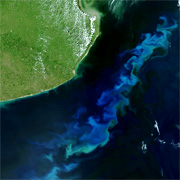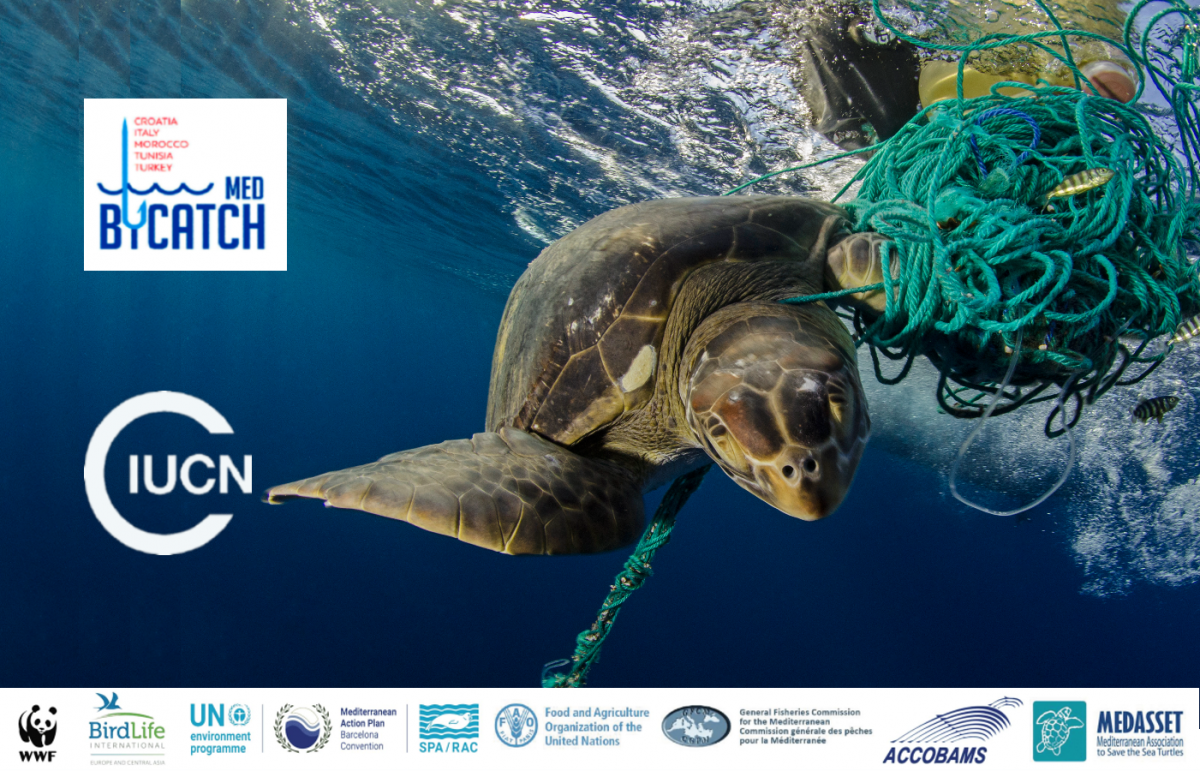Proposed global warming solution needs more scientific research, IUCN warns
A new method to combat global warming by dumping iron into the sea needs to be treated with caution, governments and scientists warn.

Photo: NASA Earth Observatory
Neither the safety nor the effectiveness of ocean fertilization – adding iron or other ‘micronutrients’ to the sea to encourage plankton to grow – have been established and the method should not be touted as a cure for climate change until they have been, cautions the World Conservation Union (IUCN).
This warning is based on a Statement of Concern endorsed by the Parties to the London Convention and London Protocol, the international agreements that regulate dumping of wastes and other matter at sea. According to an International Maritime Organization press briefing of 16 November 2007, Parties to the Convention and Protocol, unanimously adopted the June 2007 Statement of Concern issued by their scientific advisors that “knowledge about the effectiveness and potential environmental impacts of ocean iron fertilization is insufficient to justify large-scale operations”.
The idea behind the method is that micronutrients such as iron or urea will stimulate the growth of phytoplankton in the sea, which can absorb large quantities of carbon dioxide from the atmosphere. Many scientists have critiqued the technology based on studies showing little if any potential for long term sequestration but a high likelihood of damage to the marine environment. They have also noted the possibility that ocean fertilization could promote further climate change by stimulating the production of far more potent greenhouse gases, methane and nitrous oxide. Nevertheless, some companies are already promoting this method and are selling carbon offsets to the public to support their research.
The IPCC Working Group III report on Mitigation of Climate Change describes ocean fertilization as “speculative and unproven, with the risk of unknown side effects”. In that respect, Parties to the London Convention and Protocol called for “further study (of) the issue from the scientific and legal perspectives with a view to its regulation” and “urges states to use the utmost caution when considering proposals for large-scale ocean fertilization operations”.
Kristina Gjerde, High Seas Policy Adviser to the World Conservation Union, said: “Speculative technologies and unregulated voluntary markets for carbon offsets are a potentially lethal brew. This statement of concern sends a clear message to governments, soon to meet for next month’s UN climate conference in Bali, about the need to consider the full range of impacts of proposed geo-engineering fixes and to ensure that they are properly regulated to prevent adverse impacts on the environment.”
Notes to editors
For more information please contact:
Kristina Gjerde, IUCN High Seas Policy Advisor, Poland. Tel: +48-22-754-1803, +48-22-737-2300; Cell phone +48 50 117 20 48; Email: kgjerde@it.com.pl
Carl Gustaf Lundin, Head IUCN Global Marine Programme, Switzerland: +41 22 999 0204; Cell phone + 41 78 477 14 00; Email: carl.lundin@iucn.org
Sarah Halls, IUCN Media Relations Officer, Tel: +41 22 999 0127; Mob: +41 79 24 72 926;
Fax: +41 22 999 0020; Email: sarah.halls@iucn.org; Web: https://www.iucn.org
Additional information
Extracts from press release from IMO website:
Large-scale fertilization operations not currently justified, say Parties to international treaties
29th Consultative Meeting of Contracting Parties to the Convention on the Prevention of Marine Pollution by Dumping of Wastes and Other Matter, 1972 (London Convention) and 2nd meeting of Contracting Parties to the 1996 Protocol thereto (London Protocol) (LC29/LP2): 5 - 9 November 2007
Parties to the international treaties which regulate the dumping of wastes and other matter at sea, say that planned operations for large-scale fertilization of the oceans using micro-nutrients - for example, iron - to sequester carbon dioxide (CO2), are currently not justified.
The Contracting Parties to the Convention on the Prevention of Marine Pollution by Dumping of Wastes and Other Matter, 1972 (London Convention) and to the 1996 Protocol thereto (London Protocol), meeting in London from 5 to 9 November, 2007 (LC29/LP2), considered a report from their scientific advisers and other submissions relating to fertilization of the oceans to sequester CO2, using iron and other micro-nutrients.
Recognizing that it is within the purview of each State to consider proposals on a case-by-case basis, in accordance with the London Convention and London Protocol (LC/LP, the meeting urged States to use the utmost caution when considering proposals for large-scale ocean fertilization operations. "The meeting takes the view that, given the present state of knowledge regarding ocean fertilization, such large-scale operations are currently not justified."
The meeting endorsed the "Statement of Concern" on large-scale fertilization agreed by the LC and LP Scientific Groups, in June 2007, which indicated that knowledge about the effectiveness and potential environmental impacts of ocean iron fertilization was currently insufficient to justify large-scale operations and that this could have negative impacts on the marine environment and human health. The meeting agreed that the consideration of ocean fertilization falls under the competences of the London Convention and Protocol, in particular, in relation to their objective to protect the marine environment from all sources. The meeting agreed to further study the issue from scientific and legal perspectives, with a view to its regulation.
London Convention and London Protocol
The London Convention was one of the first global conventions to protect the marine environment from human activities and has been in force since 1975. Its objective is to promote the effective control of all sources of marine pollution and to take all practicable steps to prevent pollution of the sea by dumping of wastes and other matter. The 1972 Convention permits dumping of wastes at sea, except for those materials on a banned list. Currently, 82 States are Parties to this Convention. In 1996, the "London Protocol" was adopted, to further modernize the 1972 Convention and, eventually, replace it. Under the Protocol, the precautionary approach is applied and all dumping is prohibited, except for possibly acceptable wastes on the so-called "reverse list". The Protocol entered into force on 24 March 2006 and there are currently 31 Parties to it.
Both the Convention and Protocol require Parties to issue permits for the dumping of wastes and other matter at sea.
Further information on the London Convention and Protocol can be found at http://www.londonconvention.org



